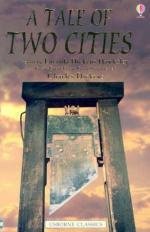|
|
A Tale of Two Cities Book 2, Chapter 21
Though Lucie spends the next several years living happily with her husband and father, she occasionally feels dread and a sense of doubt, as if she will not remain on earth for long. The sounds of the footsteps--the dream that once haunted her--have returned to her.
Time passes, and she gives birth to a daughter, also named Lucie. Lucie lives happily and tranquilly in the next several years, though not without tragedy--a son, born after the daughter, dies young. Sydney Carton continues to visit through the years, though not more than a few times a year. He feels close to the family and especially to the children, who feel pity for him even though they don't know what their mother knows about him. Before he dies, Lucie's son asks his mother to kiss Carton for him. Carton continues to work diligently for Mr. Stryver, with no ambition higher than remaining the lion's jackal.
Thus the years pass, until little Lucie is six years old. But change looms in the air:
"But, there were other echoes, from a distance, that rumbled menacingly in the corner all through this space of time. And it was now, about little Lucie's sixth birthday, that they began to have an awful sound, as of a great storm in France with a dreadful sea rising." Book 2, Chapter 21, pg. 209
One night in mid-July, 1789, Mr. Lorry comes in late from Tellson's and sits down beside Lucie and her husband at the window where they had once had the conversation in which Lucie described the echoes she heard. He tells them he believes he will have to spend the whole night at Tellson's, as there has been such an uneasiness in Paris that the company's French customers are scrambling to transfer their assets to the London branch. He says there is mania among the customers to get their property transferred to England. Darnay says that things look bad and Mr. Lorry agrees, but adds that they don't know why. Darnay replies that the sky is gloomy and threatening.
Dr. Manette comes in to join them. They chat awhile, and Mr. Lorry asks Lucie to tell them again about the echoes about which she has her theory. She tells him it is not a theory, only a fancy. Mr. Lorry asks her if the echoes are not very numerous and very loud, and he tells her only to listen to them.
Meanwhile, in Saint Antoine, a storm is brewing. The villagers, led by Monsieur and Madame Defarge, have armed themselves to the teeth, and one evening, the storm reaches fever pitch. The villagers march to the Bastille--men, women, all heavily armed with whatever they can carry--all the while burning bridges and vowing vengeance on the mercenaries who have oppressed them and kept them in poverty for so long. They battle for hours as the storm rages. A terrible flood is drenching the land, but it does not quell the mob. The rebels demand that the prisoners be freed. They accost the prison officers and tell them they will be killed if they don't obey orders.
Topic Tracking: Oppression/Class Struggle 7
Defarge asks to be taken to One Hundred Five, North Tower--the old prison cell where Dr. Manette was held unjustly for so many years. The officer takes him and Jacques Three to the tiny, dark cell. There, they see the initials "A.M."--Alexandre Manette--carved into the wall. Defarge whispers to him that the doctor, without a doubt, also carved a calendar. They begin to tear the cell apart, and everything in it, in an attempt to unearth it. They do not find it. They set the cell ablaze, then leave. They bring the officer out to the mob, who beat and stab him. Madame Defarge administers the final blows--she steps on his neck, and with her cruel knife, which she has long been waiting to use, she cuts off his head. The body is hoisted up, as a lamp, to show what the peasants are about, as was Defarge's original idea. The storm literally and figuratively rages on. In the ocean of faces of the mob, two groups of seven stand out--seven newly liberated prisoners, and seven murdered men who died at the hands of the angry mob:
"Seven prisoners released, seven gory heads on pikes, the keys of the accursed fortress of the eight strong towers, some discovered letters and other memorials of prisoners of old time, long dead of broken hearts --such, and such-like, the loudly echoing footsteps of Saint Antoine escort through Paris streets in mid-July, one thousand seven hundred and eighty-nine. Now, Heaven defeat the fancy of Lucie Darnay, and keep these feet far out of her life! For, they are headlong, mad, and dangerous; and in the years so long after the breaking of the cask at Defarge's wine-shop door, they are not easily purified when once stained red." Book 2, Chapter 21, pg. 217




